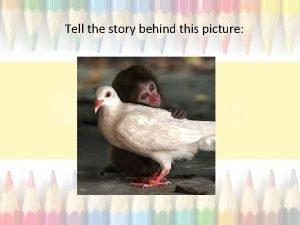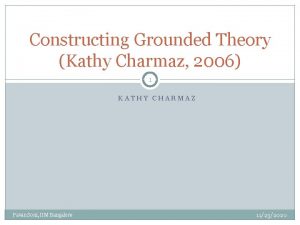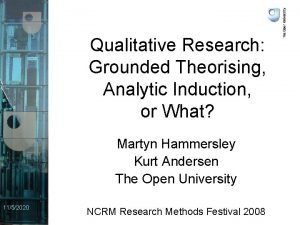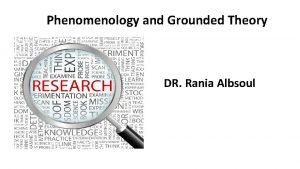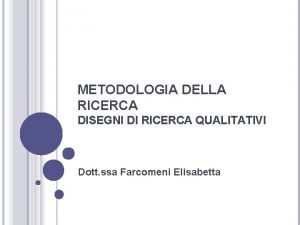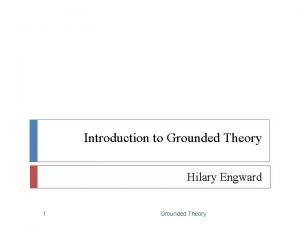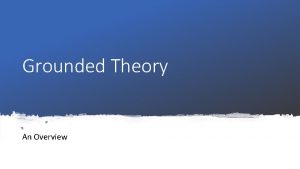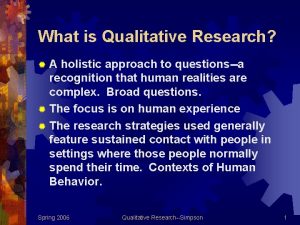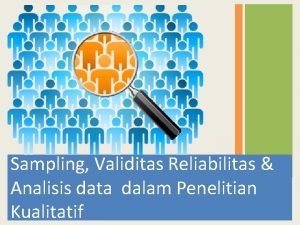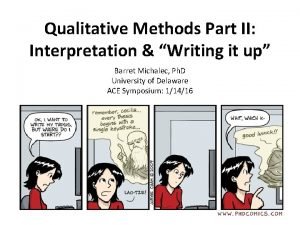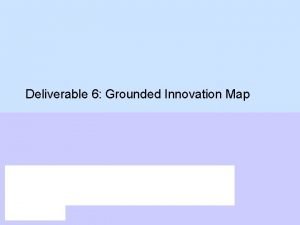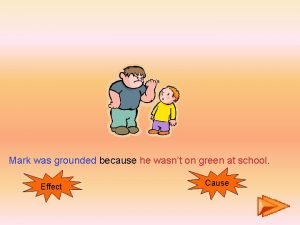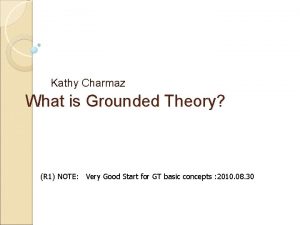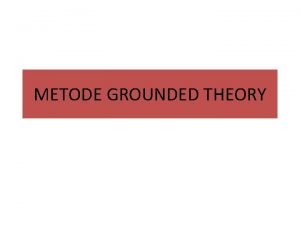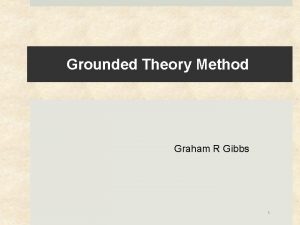What is Grounded Theory Kathy Charmaz Imagine collecting























- Slides: 23

What is Grounded Theory? Kathy Charmaz

Imagine collecting intriguing qualitative data early in your research I: So, how has life been for you? S: Well, as you can tell, it's been very busy. Between babies and marriage and life, uhm, it's kind of hard to explain, but it's been a lot different than being on my own because people rely on me now. So part of it has been good because I can see that I'm not the only one that has good days and bad days, everybody does. They might not be physical, as much as psychological, but everybody has kind of good days and bad days, as moods and things too.

Qualitative data (cont. ) Uhm, I guess the main thing, I had a fight with my husband before coming here, and what I'm kind of seeing from that is the main thing that I still have a little bit of guilt attached to or hard time, or is hard for me, is I don't know how much responsibility is mine, like what I should take on all the time.

What if you planned to conduct a qualitative research project, wouldn’t it help w • To ensure that your data are rich and • • useful? To be able to gather inductive data without getting lost in it? To have systematic strategies for collecting your data that aid you in creating an original analysis?

Grounded theory can help you • Gather rich data through guiding your data • • • collection Get started in early data analysis Use flexible guidelines for managing your research Keep focusing your analysis to make it more original and useful

What is grounded theory? A systematic method of conducting research that: • Begins with an inductive approach • Involves engaging in simultaneous data collection and analysis • Consists of several flexible guidelines • Emphasizes constructing the analysis • Aims to construct middle-range theories

What is grounded theory? (cont. ) • A method that goes beyond induction - Its strategies lead to making conjectures and hypotheses and to checking them -Therefore, the researcher engages in deductive reasoning as inquiry proceeds.

What does grounded theory help you to accomplish? This method: • Enables you to study processes • Helps you explicate what is happening in your field setting • Keeps you focused on your data and • emerging analysis Supports you in developing an original theoretical analysis

How do grounded theorists conduct research? We engage in: • Making systematic comparisons • • throughout inquiry Interacting with our data, codes, and categories Doing analytic writing from the start— memo-writing • Making early links between the empirical world and theoretical ideas—and checking them—theoretical sampling

Wouldn’t it be helpful to have a few questions to guide your research? Grounded theory gives you general questions— and points the way for you to develop further questions specific to your research problem and emerging analysis Grounded theory helps you to keep your research • Manageable • Efficient • Exciting!

Which questions do grounded theorists use when coding data? • What is happening? (Glaser, 1978) • “What is this data a study of? ” (Glaser, 1978, • • • p. 57; Glaser and Strauss, 1967) What theoretical category does this datum indicate? (Glaser, 1978) What does the data suggest? Pronounce? From whose point of view?

Wouldn’t it be helpful to have guidelines for coding qualitative data? • Use line-by-line coding as an initial tool for • • opening up the data Ask what is happening in each bit of data Compare data with data 1. Statement with statement 2. Story with story 3. Incident with incident • Then compare code with code

Coding for what is happening So part of it has been good because I can see that I'm not the only one that has good days and bad days, everybody does. They might not be physical, as much as psychological, but everybody has kind of good days and bad days, as moods and things too. Identifying a positive Recognizing other people’s good and bad days Qualifying their good and bad days Viewing good and bad days as universal

Comparing Statements: Sara Shaw— Taking a broader view beyond self So part of it has been good because I can see that I'm not the only one that has good days and bad days, everybody does. Seeing beyond self They might not be physical, as much as psychological, but everybody has kind of good days and bad days, as moods and things too Discerning the content of good and bad days

Comparing statements: Nancy Swensen dealing with her illness on a bad day and her mother with Alzheimer’s—Being caught in chaos And if I’m trying to get dinner ready and I’m already feeling bad, she’s in front of the refrigerator. Then she goes to put her hand on the stove and I got the fire on. And then she’s in front of the microwave and then she’s in front of the silverware drawer. And-and if I send her out she gets mad at me. That’s when I have really a really bad time. Making a bad day worse Escalating chaos See also, Arthur Frank (1995): “The Chaos Narrative

Comparing responses to bad days: Marty— Dealing with bad days We’re [a friend who has multiple sclerosis] kind of like mutual supporters for each other. And when she has her bad days or when we particularly feel “poor me, ” you know, “Get off your butt!” You know, we can be really pushy to each other and understand it. Reciprocal supporting Having bad days Disallowing self-pity Issuing reciprocal orders Taking the criticism

Realizing that once bad days have become good days—John What used to be bad days [laughing] now are good days …but the quality of things, I think, is declining, you know, from , say a couple of years ago when I didn’t think about it that much. And there would be isolated days when I had a lot of congestion and things like that. But that’s all. Shifting criteria of good and bad days Defining declining health Comparing past and present

What is constructivist grounded theory? It is a contemporary revision of Glaser and Strauss’s (1967; Glaser 1978) classic grounded theory that: • Assumes a relativist approach • Acknowledges multiple standpoints and realities of both the grounded theorist and the research participants • Takes a reflexive stance toward our actions, situations, and participants in the field setting, and constructions of them in our analyses.

How does constructivist grounded theory advance data collection? It fosters building explicit “what” and “how” questions into the data collection She said…, But, fortunately, I had the experience of at some point surrendering, you know. I asked, What does that mean to you, surrendering? She said, It means that I don't have, I can't control it and to look at what it has to teach me. Just, you know, let it tell me what it needs to tell me. You know, that willingness and that acceptance.

Data collection in constructivist groundedtheory And you don't always get, you know, I don't always get that right away because here I could have had a lot of "control" over my life, and then I didn't have control anymore, and so it didn't come instantly, but I was willing to surrender and to look at what was going on. But it did come, it did happen. And I'm always much more at peace after I'm able to do that anyway.

Where Does Constructivist GT Take Us? This approach leads us to • Assume that we take as “real” is • • problematic—and that our analyses are interpretive Look for multiple definitions of reality Pay close attention to language—and action • Examine how experience is constituted and structures are enacted

In sum, what is grounded theory? • An inductive, comparative, and interactive approach to inquiry that offers several open-ended strategies for conducting emergent inquiry.

Wouldn’t be helpful to? • Advance studies in your discipline? • Have a point for discussing • contemporary issues in qualitative inquiry (Henwood and Pidgeon 2003)? Adopt a flexible method with emergent methodological strategies rather than prescribed rules? Try grounded theory!
 Kathy charmaz constructivist grounded theory
Kathy charmaz constructivist grounded theory The story behind this picture
The story behind this picture Charmaz 2006
Charmaz 2006 Grounded theory coding
Grounded theory coding Understanding qualitative research
Understanding qualitative research Analytic induction qualitative research
Analytic induction qualitative research Interpretive phenomenology
Interpretive phenomenology Grounded theory esempi
Grounded theory esempi Grounded theory research
Grounded theory research Grounded theory ppt
Grounded theory ppt Example of quantitative research
Example of quantitative research The discovery of grounded theory
The discovery of grounded theory What is grounded theory in qualitative research
What is grounded theory in qualitative research Grounded theory adalah
Grounded theory adalah Qualiative research
Qualiative research Grounded theory meaning
Grounded theory meaning Grounded theory adalah
Grounded theory adalah Grounded theory
Grounded theory Variation theory collecting like terms
Variation theory collecting like terms Corner grounded delta
Corner grounded delta Grounded conductor color
Grounded conductor color Map of grounded
Map of grounded Congratulations you got grounded
Congratulations you got grounded Slime mold grounded
Slime mold grounded

